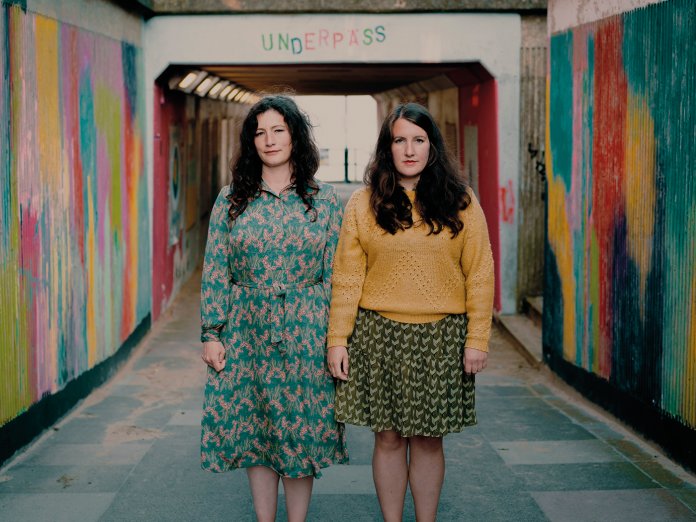“We’ve learnt a new song to drive sorrows away”, declare The Unthanks on the epic title track of their latest album. It’s a simple enough sentiment, yet one loaded with profound meaning. For a band who draw strength and inspiration from the act of communal togetherness, the past couple of years have been especially tough. Not only did the enforced lockdown prevent them from playing live, but it put a stopper in the residential workshops and weekends that have been such a crucial part of The Unthanks’ MO for a decade or so.
Sorrows Away often feels like a liberation. Back on the road since the spring, The Unthanks have already been previewing the album live, as an extended 11-piece band, their set hitting peak catharsis with the aforementioned “Sorrows Away (Love Is Kind)”, inviting everyone into its gently arcing chorus. For those of us who’ve been lucky enough to be there, it’s a deceptively moving moment. The song also contains most everything that makes The Unthanks what they are: impossibly luminous harmonies, a great arrangement, sinuous ensemble work and a symphonic sense of scale.
Sorrows Away marks a renewed shift. The Unthanks’ numerous studio projects of late – from the songs and poems of Molly Drake and 2019’s conceptual Lines to the Worzel Gummidge TV soundtrack and an a cappella live collection as the fifth instalment of their Diversions series – mean that Sorrows Away is their first non-specific album since 2015’s award-winning Mount The Air.
It’s a belated successor that easily stands comparison. Recorded at home in Northumberland, Sorrows Away announces itself with two long-form treasures. “The Great Silkie Of Sule Skerry” emerges from a soft drone and Adrian McNally’s lovely piano figure, as Becky and Rachel Unthank are gradually joined by moody brass, strings, acoustic guitar and the bassy rumble of drummer Martin Douglas. A traditional Orkney song learned from Alan Fitzsimmons of The Keelers, the Tyneside folk group whose ranks included George Unthank, the sisters’ father, it subtly changes form like the shape-shifter of the title, making for an utterly gripping eight minutes.
It eventually makes way for “The Sandgate Dandling Song”. Having been an obsession of McNally’s for some time now, ever since hearing ex-wife Rachel sing it when they first met, it tells the conflicted story of the wife of a violent North East keelman and the repercussions of domestic abuse on their son. Borrowing a tune from Eastern Europe, learned from a Polish accordion player, McNally steps up to the mic and inserts the song with a fresh verse, told from the father’s disturbed viewpoint. It’s a masterpiece of nuanced drama, burnished with mournful strings and lonely brass. Both opening songs already feel like significant events in the Unthanks canon, taking their place alongside the likes of “Mount The Air” or “Here’s The Tender Coming”.
If “The Sandgate Dandling Song” is thematically downbeat, “The Old News” provides some uplift. Written by McNally and Becky Unthank (and one of two non-traditional songs on Sorrows Away), it buds outwards like a spring flower, its promise carried on the breeze of a bright arrangement that’s part folk, part pop. “Did they tell you that breathing is a part of the healing/Friends and lovers among all others/You belong to the air”, she sings, alluding to the freedom and restorative effects of returning from an enforced period of inactivity.
The same feeling is echoed in “The Bay Of Fundy”. Initially written and recorded by US folklorist Gordon Bok, The Unthanks unmoor the song from the unforgiving tides of the Gulf of Maine and imbue it with a universal feeling of longing and natural wonder. It’s upbeat in tone, the siblings’ voices twinned in perfect harmony, intermittently shadowed by that of guitarist Chris Price, until the whole thing finally dissolves into a semi-orchestral coda.
Given The Unthanks’ rediscovered sense of flight, it may be no coincidence that Sorrows Away includes two avian-centric songs. The dashing “The Royal Blackbird” dates from Jacobite times and serves as a veiled salute to Bonnie Prince Charlie, given wings by frisky guitar, percussive allegro strings and Lizzie Jones’ trumpet.
The Irish “My Singing Bird” is just as impressive. Led by singer and fiddler Niopha Keegan, it’s a dazzling showcase for The Unthanks’ three-part harmonies. This, after all, is at the root of the band’s extraordinary gift for reinterpretation, holding true to the song’s assertion that “there’s none of them can sing so sweet”. It’s wonderful to have them back, and on such imperious form.



